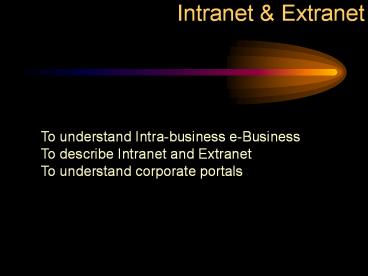Intranet - PowerPoint PPT Presentation
Title:
Intranet
Description:
When data reaches to application layer, message is ... Ubiquity of access. Open standards. Less costly. Disadvantages. System Vulnerability. Slow Links ... – PowerPoint PPT presentation
Number of Views:41
Avg rating:3.0/5.0
Title: Intranet
1
Intranet Extranet
- To understand Intra-business e-Business
- To describe Intranet and Extranet
- To understand corporate portals
2
TCP/IP
Application
Application
TCP
TCP
IP
IP
Hardware
Internet
Hardware
Sending computer
Receiving computer
- Message is sent from application layer to TCP
layer - Message broken down into packets
- TCP assigns a port number and sequence number
- Packets and TCP header, passed on to IP
- IP gives packets destination address
- Hardware turns alphabetic text packets into
electronic signals and transmit over phoneline - ISP router examines destination address and sends
off - At the receiving end we start at the bottom of
stack - Headers are stripped off as packet goes up the
stack - When data reaches to application layer, message
is assembled into its original form
3
So We have...
- Internet
- Most common platform for B2C
- We also have...
- Intranet
- Most common platform for internal corporate
system - Extranet
- The most common platform for B2B
4
Intranets
- Internal Web
- Primary platform to serve internal information
needs - A wide variety of services
- A platform for provision of news and training
- A collaboration platform for the employees
- Enables easy access to corporate resources
- Could be connected to Internet
5
Advantages and disadvantages of Intranets
- Advantages
- Low cost of converting client/server network
- Secure internal networks
- Through use of Firewalls
- Disadvantage
- Information overload
6
Types of Intranet
- A business to employee (B2E)
- Employees procure for themselves (needed
supplies) - Corporate shop
- Information dissemination to employees
- between units within the business
- between employees within the business
7
Architecture of Intranet
ERP
Application Servers
Clients Browser
Legacy System
Intranet
Internet
Web Servers E-Mail
Firewall
Product Database Customer Database
8
Corporate Portal
- Emerging due to information over-load
- Personalised
- Single point of access
- Rich content
- Narrow community
- Can be delivered in phases
9
Corporate Portal FrameworkAneja et al, Intel
Technology Journal Q1
External Content
News and News Feeds
Accessibility
Corporate Portal Applications
External Web Sites
External Services
Personalisation
Publishing
Search
External Information Resources
Security
Extensibility
Knowledge Management
Collaboration
Internal Information Resources
Data Warehouses
Integration
Business Intelligence
Internal Web Sites
Organisational Knowledge Base
Scalability
Documents
Collaboration Products
10
Extranets
- Extended Intranet
- Primary platform for B2B exchanges
- A meeting place for for trading partners
- Adds value to customer experience
- Uses Internet infrastructure
- Non-proprietary technical tool that supports EC
11
Benefits of Extranets
- Enhanced communication
- Productivity enhancements
- Business enhancements
- Cost reduction
- Information delivery
12
Advantages and disadvantages over proprietary
networks
- Advantages
- Ubiquity of access
- Open standards
- Less costly
- Disadvantages
- System Vulnerability
- Slow Links
- Human Factors
13
The Architecture of Extranet
Browser Remote Access Server Remote dial-in
Software Dialling software Firewall Web
Server Intranet VPN
Wireless Roaming Client
Remote Access Server
Corporate Client
Web Server
Firewall
Enterprise Network
Web
Internet
ISP
Browser Dialling software Connection Device
Corporate Client
Server
Web Client
Web Client
14
Need for Security
- Need
- Encryption
- Ensures privacy and Integrity
- Authentication
- Provides identification of remote user
15
Virtual Private NetworksTunnelling Technology
TCP
IP
IPSEC
- VPN
- A network that uses public network to transmit
data in secure and private manner - IPSEC
- Supported by Internet Engineering task force
(IETF) - Supported by the new IP6
- Designed to supports new encryption algorithms































